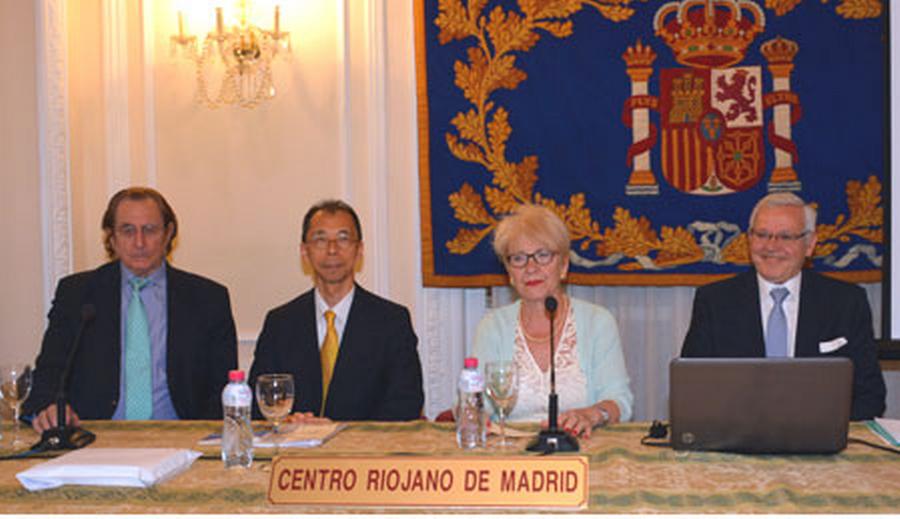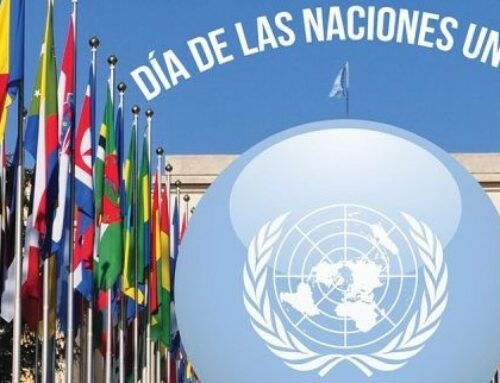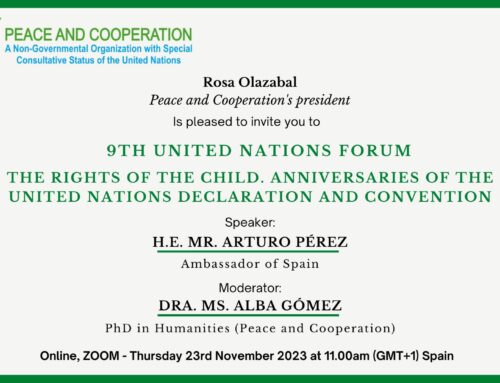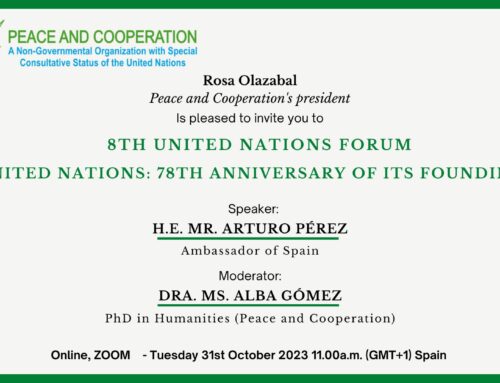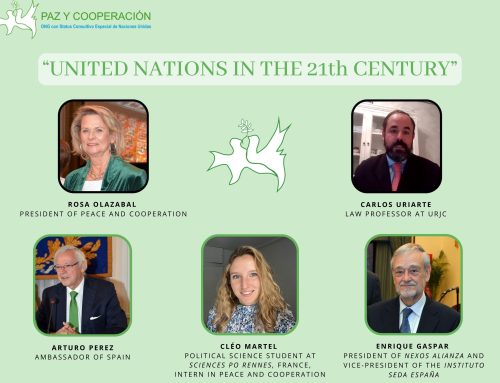On May 20th, the Centro of Riojano held a conference that was apart of the series of ̈United Nations Forums ̈, that was organized jointly with the Peace and Cooperation Foundation and the Centro of Riojano of Madrid whose intents are to address global issues and current international news. The next conference of this series, will take place on May 30th, at the hands of the Honorable Ms. Marzenna Adamczyk, Ambassador of Poland, with the topic, ̈Poland Today ̈.
In this occasion, the conference addressed the topic of ̈Tokyo 2020 ̈ at the hands of two experts such as the Spanish Diplomat, Arturo Pérez Martínez, who has spent many years in Japan and Mr. Toru Shimizu, Minister of the Japanese Embassy. In turn, they presided over the table alongside Gloria Martínez Manso, of the Board of Directors, and Joaquín Antuña, president and founder of Peace and Cooperation.
The conference started with Gloria Martínez who introduced the speakers and the relevance of the topic that was going to be addressed during the conference. For his part, Joaquín Antuña talked about his two experiences in Japan, one where he presided over the Hiroshima-Nagasaki Conference and had the opportunity to visit both cities and meet the victims of the nuclear attacks. The second experience, was when he was invited by the Chamber of Commerce and was reminded of the cranes that the children made in memory of the victims of the nuclear bombs.
For his part, the Ambassador Arturo Pérez Martínez introduced the topic to be discussed which was the Olympic Games that are going to be held in Japan in 2020 and its parallelism with the Olympic Games in Tokyo in 1964, a milestone that marked the future of Japan.
Without a doubt, the end of the Second World War, marked a high point with the beginning of the growth of the Japanese economy, which was brilliant and exceptional. Going back to 1945, Arturo Pérez recounted the events in Hiroshima and Nagasaki that were decisive for the end of the war.
But with the outlook of the Cold War, the United States’ position softened with Japan as it needed to maintain the ̈status quo ̈ in the face of the growing influence of the Soviet Union and the People’s Republic of China, and they were aware that Japan was a good ally if they were not constrained in such a demanding manner. For this reason, the San Francisco Peace Treaty was signed in 1951, between the allied forces and Japan, which resulted in the Security Treaty with the United States being signed two hours later.
In 1950, Japan was still recovering from the consequences of the war, with a GNP of 10 billion dollars and a per capita income of 100 dollars. In just 16 years, Japan multiplied its GNP by 10. In 1966 its GNP was 100 billion dollars, which can be described as a miracle. In 1964, when the Olympic Games were held in Tokyo, Japan occupied the sixth largest economy in the world, but by 1968 it was already in third place.
These Olympic Games held in Tokyo in 1964, were the first held in Asia, also known as the ̈XVII Olympiad ̈, where the government made an investment of 3 billion dollars for the
celebration of the games. But all this spending, took its toll on the Japanese economy which had a recession after the Games, with an initial moment of deficit and stagnation of the economy.
Even so, the Olympic Games opened an era of great growth for Japan, which materialized with the inauguration of the Bala Train, which connected Tokyo with Osaka and taking only three and a half hours. But the infrastructures were not everything, and the government embarked on a process of the development of athletics, where sports clubs emerged throughout the country.
The success of the Olympic Games was a catalyst and determined that the Japanese are fond of organizing these events, such as the Winter Games in Sapporo in 1972, the Winter Games in Nagano in 1998 and finally the Olympic Games in Tokyo 2020.
Undoubtedly, it is unavoidable not to question the factors of this great process, which were explained in the conference through the great vocation of the Japanese population to work and innovate, the working day, the incorporation of women to work, the strong rate of investment of companies, which have generated a great increase and adding to this, the technological assimilation. Japan not only copies technology, but also improves and surpasses it, with Japanese technology being the first in electronics and robotics.
In addition, there is a strong overlap between the states, businesses and education. The government protects and exercises a paternalism with the companies through the high tariffs in order to enjoy a large internal market. In turn, the businesses find their employees at University, where many students already commit to these companies before finishing it.
But this growth could not last forever. In the 90s, a puncture of the bubble occurs, that ends the Japanese miracle. Japan’s annual growth went from 10% to less than 1%. The Japanese economy was structured around the soil factor since 1985, and this led to an increase in the granting of loans by banks. This caused the value of the land to increase and the yen to appreciate, so exports were more expensive and therefore less competitive. When the interest rate decreased, the price of land collapsed and the stock market collapsed and the capacity of companies to finance themselves. Undoubtedly, the collapse of companies and the decline of credit, affected the wages that fell and with it, private consumption. It generated without a doubt, a lost decade for the Japanese economy.
With the new millennium, the hope of economic recovery was on the horizon and new milestones appeared which characterized Japan in this new millennium. On the one hand, the signing of the TPP Agreement in 2016, which after the abandonment of the United States of the agreement, becomes the Integral and Progressive Treaty of Trans-Pacific Partnership (CPTPP) is an important milestone. In addition, the signing of the Economic Association and Strategic Association Agreements with the European Union in 2018. And undoubtedly one of the most important milestones, is the abdication of the former emperor, and the transfer to his son Naruhito as new emperor from May 1, 2019, which begins with a new era “Reiwa” (harmony).
Undoubtedly, the completion of the 2020 Olympic Games in Tokyo is expected to be a great success, given the preparation and the strong Japanese investment. It is also expected that these Games will open a new cycle of progress, as the Olympic Games of 1964 did, but with news and differences regarding this.
Japan is no longer the second world economic power, but has been surpassed by China and no longer grows at the rate of them. In addition, the aging of the population undoubtedly differs from the “baby-boom” that characterized the post-war period. In addition, the urgent need for labor so that productivity and competitiveness continue is very important. Even so, the vision is optimistic since Japan has always overcome its worst crises, such as the crisis of WWII and of the 90s.
For his part, Minister Toru Shimizu, tried to explain the security situation in Japan, which undergoes a change from the 90s, with the fall of the Soviet Union and the schematic change of the geopolitics of the European continent. Therefore, internal debates are held in the Japanese parliament, on which was the most appropriate position and in which direction Japan should go. Japan realized that they only contributed to the international community in the economic field and began to realize that they can not continue at that pace, without contributing to the maintenance of Peace and Security especially taking into account the world so globalized in the that we live.
Since the 9/11 attacks, and the ensuing events in several countries, Japan has the need to change and therefore, introduced a new law to contribute to the maintenance of peace under the authority of the United Nations and ensure the security in Asia.
But this does not mean, as clarified, that Japan wants to return to the 30s and 40s, but in a world as globalized and with the great weight that this country has in international geopolitics, it has to adapt to the international community. Even so, they have clarified that their self-defense forces are not comparable to those that other countries can possess.
Undoubtedly the minister, clarified that Japan only wants to defend the fundamental values such as freedom, respect for human rights and the rule of law. Since many corners of the planet are witnessing the phenomena where these values do not prevail even within the European continent.
Therefore, Japan, which is a country dependent on international trade, needs and is fundamental to ensure the basis of these fundamental values in all countries and especially in its neighboring
Asian countries.
At the end of these two magnificent exhibitions, a question round was opened, in which the great interest that the subject had for the spectators, who showed their knowledge and their great passion for Japan, was manifested.
The conference was without a doubt a success, addressing the relevant and necessary topic of Japan. It is necessary to clarify that in this globalized world, the protagonism that Asia currently has in our near future, will aid and have a great role in the development of Japan.

